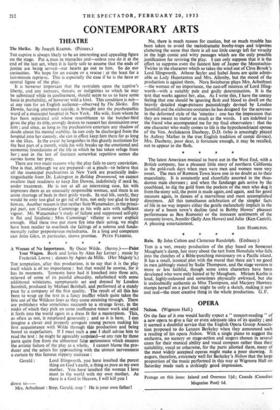CONTEMPORARY ARTS
THEATRE
The Shrike. By Joseph ICranun. - (Princes.) THE captive is always likely to be an interesting and appealing figure on the stage. Put a, man in manacles and—unless you do it at the end of the last act, when it is fairly safe to assume that the ends of justice are being served—our hearts go out to him. So do our curiosities. We hope for an escape or a rescue : at the least for a last-minute reprieve. This is especially the case if he is the hero or central figure of the play. It is however important that the restraints upon the captive's liberty, and any tortures, threats, or indignities to which he may be submitted while in confinement, should seem to us to have scime basis in probability, of however wild a kind. This condition is not— at any rate for an English audience—observed by The Shrike. Jim Downs, having attempted suicide, is brought into the psychopathic ward of a municipal hospital in New York. His wife, from whom he has been separated and whose resemblance to the butcher-bird gives the play its title, strongly desires to reassert her domination over him ; and since, as long as the psychiatrists entertain any shadow of doubt about his mental stability, he can only be discharged from. the hospital into her custody, she can in effect keep him there for as long as she likes. In the event he languishes in this ghastly institution for the best part of a month, while his wife breaks up the emotional and economic foundations of the life in which he has taken refuge from her ; and in the last of fourteen somewhat repetitive scenes she carries home her prey. There are two main reasons why the play fails to carry conviction. One is that, although we are prepared—at a pinch—to believe that all the municipal psychiatrists in New York are practically indis- tinguishable from Dr. Lakington in Bulldog Drummond, we cannot swallow their readiness to keep Jim Downs, indefinitely if need be, under treatment. He is not at all an interesting case, his wife impresses them as an unusually responsible woman, and there is an acute shortage of beds in their grisly wards. In real life, surely, they would be only too glad to get rid of him, not only too glad to keep him on. Another reason is that neither Sam Wanarnaker, in the princi- pal part, nor Constance Cummings as his wife acts with sufficient vigour. Mr. Wanamaker's study of failure and suppressed self-pity is flat and fatalistic ; Miss Cummings' villainy is never explicit enough. Had these two put more fire into their acting, we might have been readier to overlook the failings of a solemn and funda- mentally rather preposterous melodrama. In a long and competent cast John Glen, in particular, shows promise. PETER FLEMING.


































 Previous page
Previous page